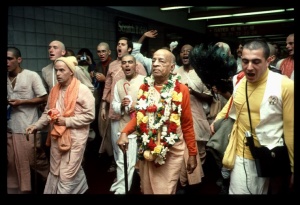CC Adi 6.68 (1975): Difference between revisions
(Vanibot #0027: CCMirror - Mirror CC's 1996 edition to form a basis for 1975) |
(Vanibot #0020: VersionCompareLinker - added a link to the Version Compare feature) |
||
| Line 2: | Line 2: | ||
<div style="float:left">'''[[Sri Caitanya-caritamrta (1975)|Śrī Caitanya-caritāmṛta (1975)]] - [[CC Adi (1975)|Ādi-līlā]] - [[CC Adi 6 (1975)|Chapter 6: The Glories of Śrī Advaita Acārya]]'''</div> | <div style="float:left">'''[[Sri Caitanya-caritamrta (1975)|Śrī Caitanya-caritāmṛta (1975)]] - [[CC Adi (1975)|Ādi-līlā]] - [[CC Adi 6 (1975)|Chapter 6: The Glories of Śrī Advaita Acārya]]'''</div> | ||
<div style="float:right">[[File:Go-previous.png|link=CC Adi 6.67 (1975)|Ādi-līlā 6.67]] '''[[CC Adi 6.67 (1975)|Ādi-līlā 6.67]] - [[CC Adi 6.69-70 (1975)|Ādi-līlā 6.69-70]]''' [[File:Go-next.png|link=CC Adi 6.69-70 (1975)|Ādi-līlā 6.69-70]]</div> | <div style="float:right">[[File:Go-previous.png|link=CC Adi 6.67 (1975)|Ādi-līlā 6.67]] '''[[CC Adi 6.67 (1975)|Ādi-līlā 6.67]] - [[CC Adi 6.69-70 (1975)|Ādi-līlā 6.69-70]]''' [[File:Go-next.png|link=CC Adi 6.69-70 (1975)|Ādi-līlā 6.69-70]]</div> | ||
{{CompareVersions|CC|Adi 6.68|CC 1975|CC 1996}} | |||
{{RandomImage}} | {{RandomImage}} | ||
==== TEXT 68 ==== | ==== TEXT 68 ==== | ||
<div class="verse"> | <div class="verse"> | ||
:api bata madhu-puryām ārya-putro | :api bata madhu-puryām ārya-putro 'dhunāste | ||
:smarati sa pitṛ-gehān saumya bandhūṁś ca gopān | :smarati sa pitṛ-gehān saumya bandhūṁś ca gopān | ||
:kvacid api sa kathāṁ naḥ kiṅkariṇāṁ gṛṇīte | :kvacid api sa kathāṁ naḥ kiṅkariṇāṁ gṛṇīte | ||
| Line 27: | Line 26: | ||
<div class="translation"> | <div class="translation"> | ||
"O Uddhava! It is indeed regrettable that Kṛṣṇa resides in Mathurā. Does He remember His father's household affairs and His friends, the cowherd boys? O great soul! Does He ever talk about us, His maidservants? When will He lay on our heads His aguru-scented hand?" | |||
</div> | </div> | ||
| Line 34: | Line 33: | ||
<div class="purport"> | <div class="purport"> | ||
This verse appears in Śrīmad-Bhāgavatam ([[SB 10.47.21]]) | This verse appears in Śrīmad-Bhāgavatam ([[SB 10.47.21]]) in the section known as the Bhramara-gītā. When Uddhava came to Vṛndāvana, Śrīmatī Rādhārāṇī, in complete separation from Kṛṣṇa, sang like this. | ||
</div> | </div> | ||
Latest revision as of 19:04, 26 January 2020

A.C. Bhaktivedanta Swami Prabhupada
TEXT 68
- api bata madhu-puryām ārya-putro 'dhunāste
- smarati sa pitṛ-gehān saumya bandhūṁś ca gopān
- kvacid api sa kathāṁ naḥ kiṅkariṇāṁ gṛṇīte
- bhujam aguru-sugandhaṁ mūrdhny adhāsyat kadā nu
SYNONYMS
api—certainly; bata—regrettable; madhu-puryām—in the city of Mathurā; ārya-putraḥ—the son of Nanda Mahārāja; adhunā—now; āste—resides; smarati—remembers; saḥ—He; pitṛ-gehān—the household affairs of His father; saumya—O great soul (Uddhava); bandhūn—His many friends; ca—and; gopān—the cowherd boys; kvacit—sometimes; api—or; saḥ—He; kathām—talks; naḥ—of us; kiṅkarīṇām—of the maidservants; gṛṇīte—relates; bhujam—hand; aguru-su-gandham—having the fragrance of aguru; mūrdhni—on the head; adhāsyat—will keep; kadā—when; nu—may be.
TRANSLATION
"O Uddhava! It is indeed regrettable that Kṛṣṇa resides in Mathurā. Does He remember His father's household affairs and His friends, the cowherd boys? O great soul! Does He ever talk about us, His maidservants? When will He lay on our heads His aguru-scented hand?"
PURPORT
This verse appears in Śrīmad-Bhāgavatam (SB 10.47.21) in the section known as the Bhramara-gītā. When Uddhava came to Vṛndāvana, Śrīmatī Rādhārāṇī, in complete separation from Kṛṣṇa, sang like this.